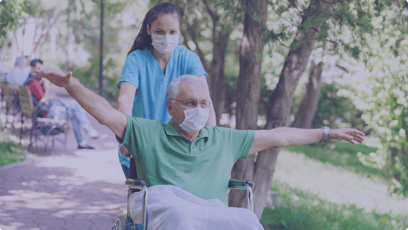A nurse’s typical job description doesn’t capture the essence of all the new roles nurses have taken on to keep facilities running smoothly and communities safe during this public health emergency. Nurses are putting their personal health at risk every day. They’re under incredible physical and psychological strain. They’re among the 95,000 health care workers in Canada who have contracted COVID-19 and the 43 who have died.
Here’s who nurses are during the pandemic. And here’s why they’re OUR heroes:
Educators
The pandemic has been a learning experience for everyone and nurses have been our most trusted teachers from day one. They’ve shared their knowledge of symptom awareness, of sanitization procedures and proper measures to ensure disease prevention with individuals, patients, with families, with the public at large. They’ve been champions of evidence-based patient management and worked to correct misconceptions and disinformation on the importance of public health measures and vaccines for the benefit of all.
Fighters
In healthcare settings, we often speak about patients as the fighters. Fighting illness or fighting back after an accident or injury. With the pandemic, where limiting the spread of infection is so critical, it’s nurses who are our frontline fighters. Nurses constitute the majority of healthcare providers and all their actions are geared towards fighting this virus, from detecting cases, to testing and triaging patients, managing sanitization and providing essential treatment.
Protectors
With so many new and stringent safety protocols instituted since the beginning of the pandemic, nurses’ duties have expanded enormously. They’re now implementing and enforcing sanitization routines. They’re making sure people are masked and that hands and surfaces are sanitized. They’re managing and safeguarding medical supplies and equipment, including Personal Protective Equipment. Many have taken on additional protective duties, including contact tracing and vaccine administration. Nurses are reinforcing that layer of defense to ensure everyone’s safety.
Leaders
Nurses have intimate knowledge of the facilities in which they work and the needs of their patients and residents. Many of them have been instrumental in driving policy decisions around how best to respond to the pandemic crisis. As leaders in recovery efforts inside their facilities, they’re critical to the success of regional and national efforts.

Individuals are drawn to the nursing professions not primarily because of job considerations, but because they’re health leaders who are deeply passionate about patient care. Many see this commitment as a lifelong obligation. In Ontario, calls for pandemic aid inspired over 3,300 of nurses to come out of retirement to assist their former health institutions, colleagues and communities.
Caregivers
The role of direct caregiver is still topmost for nursing staff, but the pandemic has complicated that function and added stresses and demands. Nurses have had to balance their patient care role with the increased need to protect themselves, fellow staff, other residents and members of the public from infection. Nurses are doing more than ever and working around the clock to provide high quality care despite these new challenges.

Caregiving took on added dimensions when isolation and travel restrictions kept family and friends from visiting their loved ones in long-term care facilities. Nurses stepped up to fill the role, making residents comfortable and supported throughout extraordinarily trying circumstances. Knowing how important family connections are to successful health outcomes and psychological well-being, nurses became messengers, too. Many even used their own phones to set up chats and share photos and texts between residents and far-flung family. In the midst of a pandemic emergency, nurses have helped maintain lifelines of love and communication between people.
The COVID-19 pandemic has been difficult for everyone, but it would be immeasurably more challenging without nurses. Motivated and trained to keep their communities safe, nurses have exhibited all the compassion of their positions despite the added risks, long hours and incredible uncertainty.
We would be lost without nurses during this pandemic.
Thank you for your hard work and dedication.
Thank you for your care.
Thank you for keeping us safe.








